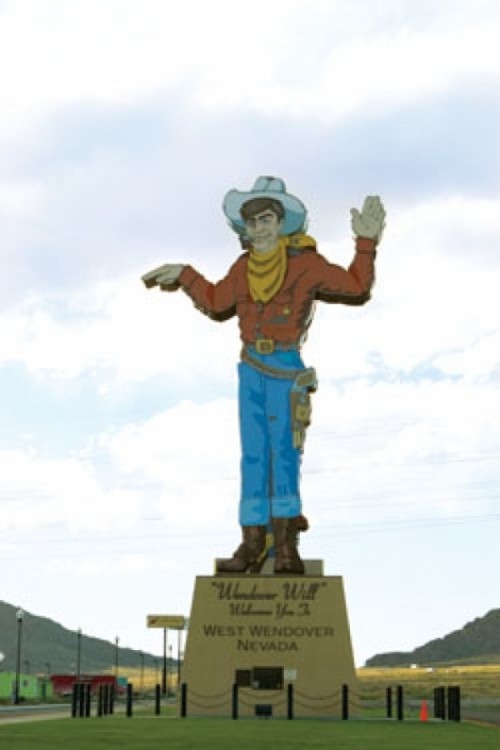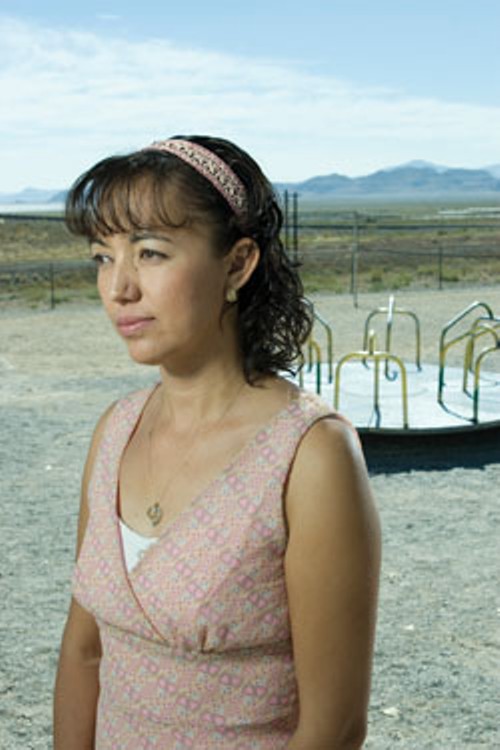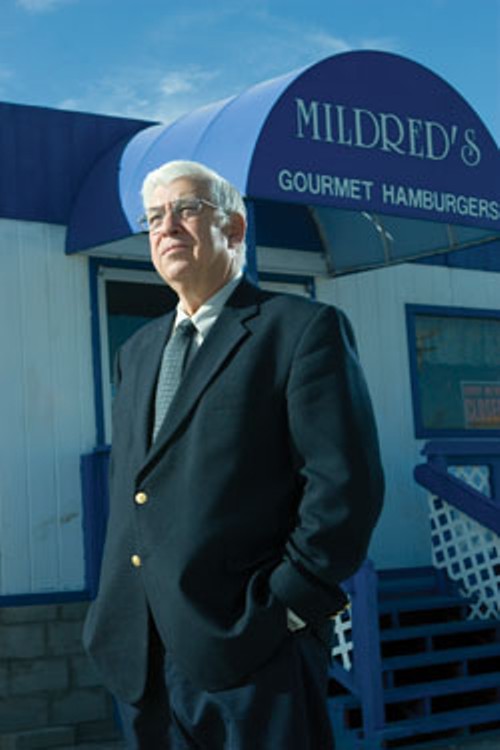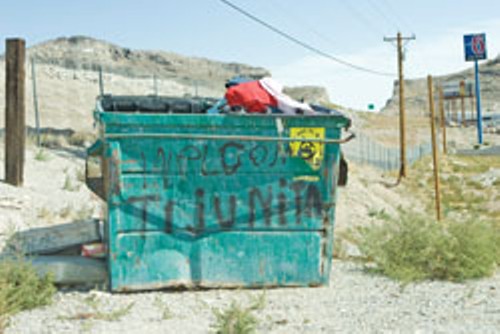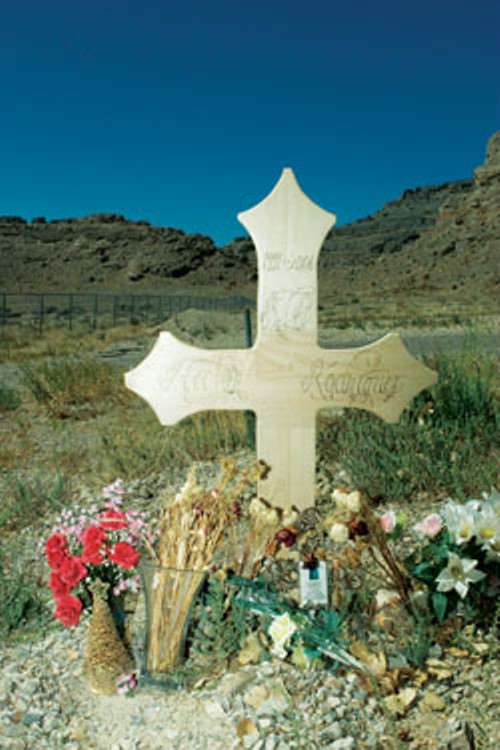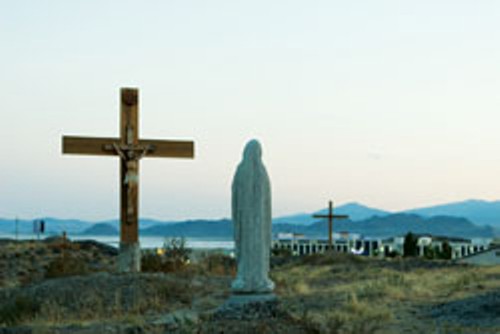Crap Shoot
Mexican immigrants bet on a better life in Wendover. But is there a better payout for the kids?
By Stephen Dark @stephenpdarkWendover can be a tough place.
Deepak Sharma found the border town so hard that the 36-year-old set himself on fire one April morning in an apartment on Wendover’s Utah side. The immigrant from India worked as a dealer at the Peppermill Hotel Casino in West Wendover, Nev. Like many immigrants to Wendover, he slept in an apartment on the barren Utah side, then drove the five minutes to his casino job on the more plush Nevada side of the border.
It was rumored Sharma faced deportation, but whatever his reasons, the horrific suicide cast a harsh light on these strange, isolated twin communities—Wendover, Utah, and West Wendover, Nev.—and their relationship to the casino-driven economy that provides a good life for so many.
Listen to residents talk about a recent rumble between two large teenage groups from each side of the border behind a West Wendover gas station, and it is reminiscent of a real-life West Side Story. But life in Wendover has less to do with the teenage angst of the Jets and the Sharks than it does, in this era of illegal-immigrant crackdowns, with fear.
That was a lesson Shirley Shelton learned when she ran down from her home overlooking the Bonneville apartment complex to help 13 mostly Hispanic families who’d been displaced by Sharma’s self-immolation. Shelton organized a translator, a driver and a school bus to take them to the community center. But the fire’s survivors refused to leave.
By the time firefighters extinguished the blaze, a frustrated Shelton was close to tears. “They thought we were deporting them to Mexico,” she says. “They didn’t trust us because we’re white.”
Yet, these same fearful souls provide casinos with their prime labor pool. Hispanics, for example, make up 65 percent of the 2,000-strong Peppermill Properties workforce. According to local government officials, 80 percent of Wendover, Utah’s 1,600 residents and 70 percent of West Wendover, Nevada’s 5,000 residents are Hispanic.
But employment, of course, is no guarantee that workers are documented, nor does it provide immunity from illegal-immigrant sweeps. West Wendover juvenile probation officer Jose Saucedo estimates that half of the local Hispanic workforce is illegal, which adds up to a lot of stolen Social Security numbers.
Aboite, a Nevada-side resident who works out of an office in the Utah-side Anna Smith Elementary School, was “awesome” at helping out the residents, Shelton says. “They trusted her; they would listen to her,” she says.
That trust was earned the hard way. Salt Lake City’s Holy Cross Ministry hired Aboite in 1999 to guide those in Wendover’s communities who need social services to resources in Utah’s Tooele County and Nevada’s Elko County. Wendover itself has little to offer, Aboite says. All that’s available, she says, is the local federally funded Women, Infant and Children (WIC) nutrition program, which provides support for low-income women and kids up to 5 years old.
Much of Wendover’s need for social services stems from the negative impact of casinos that dominate the skyline, say some local critics. “If your main industry is gambling, it has a negative pull on the community at large,” says Anna Smith school principal Kent Parsons. “Liquor flows freely in the casinos, so if you have a problem with drinking, it’s going to be the last place you want to live.”
While Aboite acknowledges a blackjack dealer with no education beyond elementary school in rural Mexico can climb the casino ladder to earn $40,000 to $60,000 a year, she wonders at what cost to him and his family. Many employees, she says, gamble on their time off, while others succumb to the easily accessed alcohol.
And then there are the working hours. The busiest time for the open-24/7 casinos is from 6 p.m. Friday and Saturday nights to the early hours of Saturday and Sunday. That’s when most employees are needed to deal, run the pits, serve drinks and food and work in the kitchens. These workers usually get two days off during the week.
“The odd hours our parents have to work impact our school heavily,” says Parsons. “Often, they can’t come to parent-teacher conferences or things like back-to-school night. Our children will go home, and maybe nobody’s there until midnight when Mom gets off shift.”
In most neighborhoods, such kids are called “latchkey.” Parson reckons half of his 220 students from kindergarten through sixth grade are latchkey. Although, given the poor conditions of many Wendover trailers, whether or not they have latches or keys may be a moot point.
Alan Rowley owns local gourmet-hamburger haunt Mildred’s and also teaches at Wendover High School. He sees firsthand the strains casino life can put on employees’ families. One teenage student asked Rowley to adopt him. Another, at the onset of spring break, begged to be able to come to school during the vacation. Rowley insists on giving a third student a hug every day he sees him, simply because the child seems so vulnerable, so alone. “It breaks your heart,” he says.
Parents make choices, Aboite says, and one of the choices facing those who toil in Wendover’s gaming industry is whether to let their bets on the casinos ride or move to another part of the United States, where their children can learn that the world doesn’t begin and end in a one-trick border town.
“You know [this environment] is not doing any good for our families. Yet, economically, it’s supporting them,” Aboite says about the Hobson’s choice she and so many in her community face. “It’s up to you. What do you want to take?”
The cost of this one-industry town, as Aboite and Saucedo can attest through their work, is not only several generations of latchkey Hispanic and Anglo children. It’s also an increasing number of teenagers drifting into crime—or a lifetime of servitude at the labor-hungry casinos.
“If we don’t try to send our kids to college,” Aboite asks, “how can things ever get better?”
Welcome to "Tijunita"
Living in Wendover, says school principal Parsons, “is more like living in Mexico than in the U.S. simply because that’s who lives here.”
The Mexican presence is felt not only in what some claim to be Wendover’s best restaurant, the Mexican eatery Salt Flats. There’s also cockfighting and horse races on the outskirts of town on the Nevada side. Latino bettors spend five hours drinking and talking about the upcoming single race of the day, and then they wage thousands of dollars on the outcome. Often, after horses cross the finish line, they fight.
Anglos weren’t always the minority in this border town. One hundred years ago, Wendover, Utah, was no more than a railroad-watering stop. By World War II, it boasted a potash-mining industry on the Bonneville Salt Flats and a mostly LDS community of 600. In 1943, thousands of Army and Air Force personnel invaded the town for a top-secret project. The Enola Gay B-29 Super Fortress flew its practice runs from Wendover Fields in preparation for dropping the atomic bomb on Hiroshima.
What remains of the military and railroad past in Wendover, Utah, is mostly condemned shacks and rotting barracks littering a desolate gray landscape.
“Sometimes I get the feeling [Utah] just wishes [Wendover] would evaporate, go away,” sighs Wendover Judge Lamarr Melville.
The disappearance Melville ponders won’t happen, says Wendover City Administrator Glen Wadsworth. But the problem, as ever, is funding. “We have unique money issues,” says Wadsworth. “We don’t have a strong tax base; there’s not a lot of businesses here anymore. Why they’ve gone away, I don’t know.”
Among all that’s left is the potash mining company, a cinema, two Mexican restaurants, hotels, a storage site and a recently opened Family Dollar store. That store, Melville says, “is the best thing to hit here in a long time.”
All the same, Wadsworth is confident of Wendover, Utah’s future. “It might decline some, but there’s a core of people who like to live here.” Wadsworth enjoys the small-town, friendly feel of Wendover and loves the surrounding desert and mountains. “On a clear day, you can see 100 miles,” he says.
That core of Wendover fans probably don’t extend to some of the areas Parsons is thinking about when he says, “You don’t have to be a rocket scientist to go through Wendover [Utah] and see it’s a poverty zone. It’s quite a grim place. There are several pockets that are just ghettos.”
One of those ghettos lies behind the Bonneville apartments. It’s a patch of dirt and trailers called “Tijunita” by its mobile-home residents. Whether the folk who live in Tijunita may be counted among Wadsworth’s happy core is debatable, says Aboite. She believes Tijunita’s residents view their stay in Wendover as temporary. And yet, somehow, years march on, and they end up staying. Tijunita’s tire-covered roofs offer ample evidence of Wendover’s poverty. That impression is underscored by the lack of paved roads and sidewalks. There is little low-income housing other than these run-down trailers. “I don’t recall a demand for low-income housing,” Wadsworth says. “People just accommodate themselves.”
Which they do … in Tijunita.
Down and Dirty
Rosa Covarrubias is a blackjack dealer who understands a casino paycheck can help give her children a better life. Her friend “Julia,” who requests a pseudonym out of fear that her common-law husband will retaliate, reveals the opposite.
Covarrubias crossed the Mexican border in 1990 to join her husband Phillipe to spend the next seven years picking strawberries, grapes and peppers in California. For each 2-foot bin she filled with peppers, she earned 40 cents. Then, they rented land and planted strawberries. “We worked seven days a week—I almost died,” she says. The most they ever earned was $2,000 for one season’s harvest. “I didn’t see my kid. I took her to a babysitter.”
Philippe’s brother, already working as a casino dealer in West Wendover, encouraged the Covarrubiases to join him. Rosa thought the streets would be lined with tuxedo-clad gamblers. They rented an apartment in Wendover, Utah, for $250 a month. Two years later, they bought a house in West Wendover.
She started as a casino change person. After her gritty migrant-work experiences, her new work conditions delighted her. “I took a shower before I went to work. I put on makeup, black pants and a uniform. It was the best.”
Things only got better. She started dealing cards for eight-hour shifts. While working in the fields of California farms, she often asked God for a job where she would be paid for doing nothing. Standing by her table waiting for gamblers to deal to, she felt her dream had come true.
Covarrubias’ eldest son, 21-year-old Jairo Dario, is assistant to the general manager of a Hampton Inn in Henderson, Nev. His mother talks proudly of the scholarships he won at school and how she once urged him to think big: “You have to go away from here.” His picture is in a frame in a corner of her living room.
But, while young Jairo Dario might well mark the epitome of an immigrant’s success in Wendover, “Julia” is less laudatory of the town’s possibilities.
Julia grew up on a rancho in the poor rural province of Zacatecas, Mexico, from where, Aboite says, the majority of Wendover’s Hispanic population originates. In Spanish, Julia tells how, after her father died when she was 8, she worked sol a sol, from sunrise to sunset, pulling vegetables out of the ground for surrounding farms. For the next 22 years, she worked the fields.
After having three children with one man who eventually left her, her second partner came to work near the rancho. “He treated me well,” she says. “He was responsible, a hard worker.” They lived together and had two children. He went to work in the United States and, three years later in 2000, paid $3,000 for coyotes to guide her and their two youngest children, age 3 and 5, across the border. She recalls the bitter cold as she slept on the desert floor, her arms wrapped around her children.
But, if she thought she was walking to the American Dream, she would be disappointed. Her partner was working in El Pepper—as she calls the Peppermill—and he rented a small trailer. “He got me good papers, but they weren’t mine,” she says. And, furthermore, the man she had known in Mexico had changed. “He got wrapped up in [gambling],” she says. “He was very machista, very hard-headed.”
They argued about everything, especially money, since he spent his wages on gambling and drinking. She cleaned rooms in a hotel for $5.15 an hour, the Utah minimum wage, hardly enough to feed and clothe her children.
“You never forget the first time,” she says regarding when he hit her. She waves at her tear-streaked face with her palms, as if her tears are scalding her cheeks. “He always hit me like he was hitting a man,” she says. “He knocked me on the floor, kicked me.”
Her mother told her she had to put up with it. What a man says, goes. Violence, if she did not want to be alone, was a woman’s destiny.
Julia would tell the children to go away when he beat her. Finally, her 16-year-old daughter called the police. But, after he had to pay for classes on domestic abuse, it only got worse. “He was strangling me,” she says. “I defended myself as best I could.” She clawed his chest, and he let go.
When the police came, he put on a black T-shirt to cover his wounds. “I didn’t report him,” she says. “I was afraid they would lock me up. What would I do for the kids?”
Julia fought back and says her partner learned his lesson. He didn’t lay another hand on her. They broke up a while later over his gambling. “He was using the food money to play the slot machines,” she says. “I told him it was enough, to go away.”
After working in a casino for 18 months cleaning slot machines, she was let go. Now, Julia takes odd jobs wherever she can find them. At times, she thinks of going back to Mexico. But, her nephews in Zacatecas are so poor, all they eat are tortillas with salt. And now, she can’t send them any money.
“I bet on the country of opportunity,” she says. “It’s good here. My children don’t have to work under the sun in bare feet. Here, they have shoes. We didn’t come to rob anyone. We came so our children would have a better life.”
Salt Lake City therapist Eleanor Ulibarri has treated 10 women from Wendover with similar stories. A number suffer from “raccoon eyes,” she says, which occur after a blow to the forehead when blood settles around the eyes. Ulibarri tapes up pamphlets in Mexican restaurant bathrooms in Salt Lake City offering help for victims of domestic violence. But getting word out in Wendover is much harder. “I’m willing to bet it’s a huge problem there that goes unreported,” she says, citing the geographical isolation, fear of the Citizenship and Immigration Services (CIS), lack of legal knowledge and intimidation by male partners as key factors.
For Aboite, Julia fought back “a little late.” Her children witnessed years of abuse and now her eldest daughter’s five-month pregnancy suggests, she says, that the next generation may be going down a similar road as the mother.
“For women to go alone against [the casino] environment is too much,” Aboite says.
Child’s Play
One sign of how the environment can overwhelm young people lies buried in the hillside cemetery above Wendover, Utah.
At this windswept place, Mormons lie beside Catholics, Hispanics beside Anglos. But what stands out, along with the layers of brightly colored artificial flowers that festoon the Hispanic graves, is that at least four of the recent dead are young Hispanics barely over 20. Several died from drunken-driving accidents. That’s because there’s little for young people—Hispanic and Anglo—to do in Wendover other than drink, some residents claim.
The Boys & Girls Club of Greater Salt Lake donated in 1995 a now battered triple-wide trailer to house West Wendover’s only recreational center. Rec-center director Shawn Gregory hopes to open a new $3 million facility next year, if all goes to plan.
“Since I was a kid, they’ve been trying to build one,” says skeptical West Wendover juvenile probation officer Jose Saucedo.
For young children, there’s a day-care center called Kids Are People, Too. Until this summer, the privately owned center could take only 65 children and was open only on weekdays from 9 to 5 and closed on school holidays. Being closed weekends is especially problematic since that is when most parents need to work at the casinos. Former employee Rhonda Clark just took it over in September and has extended the hours from 6 a.m. to midnight, Monday through Saturday, with capacity for 85 children.
This is in contrast with Las Vegas, where day care is available 24/7 and where some resorts work closely with nearby day-care facilities and even provide employees with childcare.
Regardless of whether this problem should be tackled by private businesses or the casinos themselves, schoolteacher and restaurateur Rowley asks, “When is there time for the child?” Parents, he says, often pressure their children to apply for work at the casino after the age of 14. “Hispanics don’t go to college,” he says. “They don’t have a background knowledge of the big, old world.”
Juvenile probation officer Saucedo agrees. “It’s 100 percent true that most parents prefer to have their kids work than go to school,” he says.
Utah’s Wendover High School principal John Barrus says that 19 students out of 24 graduated this past academic year. Eight are going to college. When pressed as to how many of those eight are Hispanic, the typically ebullient Barrus mulled over his jotted-down list of soon-to-be college freshmen and said, “A high percentage are Caucasians.”
Anna Aboite’s eldest child Anais is a senior at Wendover High School and plans to graduate. Unlike many of her former classmates who’ve dropped out, her sights are set on college.
“We succeeded in this environment because she’s going to graduate,” Aboite says. That’s because Anna Aboite and husband Moises did what many parents fail to do, Rowley says. “Moises asks me once a week, ‘How’s she doing?’” he says with a smile.
The Aboites’ daughter wants to be a therapist and work with teenagers, partly because, her mother says, of the number of pregnancies she’s long witnessed among her friends. But Anais’ college plans are the exception because most of Wendover’s Hispanic youths have little or no idea of the possibilities beyond the city limits of the two towns. Aboite still fears, though, that her daughter may be waylaid from her plans by the lure of her friends idling around town or working at the casinos.
Jose Salgado, 17, daydreams of becoming a professional boxer. He dropped out of school last year and works in one of the alternatives to casino labor: fast food. “I never thought about leaving Wendover,” he says.
Something of the same lack of direction is evident in 18-year-old high school graduate, Lleselia Rosales. “I want to go to college,” she says, “[but] it’s hard.” One obstacle Rosales faces is convincing her parents that going on to further her education is a good idea. But, whatever they think, she says she doesn’t want to stay in Wendover. Yet, she hasn’t applied for any scholarships. “I thought I would never qualify for one of them, so why try? I’m not one of the smart people.”
Aboite corrects her. “Only the dumb people don’t graduate from high school,” she says archly.
“Here, there’s nothing,” Rosales says. “I’m not going to just work and work. I want to see what’s out there and try different things.”
And how does she see herself escaping Wendover?
“I don’t know,” she says. “Talk to my friends and have them encourage me.”
Aboite says Rosales is already working weekends as a waitress, making good money at a casino. “And once they go into it, it will be harder to leave,” she adds.
Cap in the Hand
“All the kids in our town, their dream is to have a car, dress up really nicely, have money in their pockets,” Aboite says.
“If you talk to the parents, most will barely speak English, most didn’t finish elementary school,” she continues. “How can they make their kids stronger, have a stronger self-esteem?”
Probation officer Saucedo has an answer to that question: “If I’m not strict, and the parents aren’t strict, the kids don’t stand a chance.”
His workload, he says, is about 95 percent drug and alcohol cases. The first week of September, he has 51 youths to supervise. He goes into the bathroom of his mobile-trailer office by West Wendover High School and counts the number of urinalysis tests that are positive for drugs or alcohol. Five kids, he says, are going to be arrested and taken to Elko, two hours west. Along with no hospital or jail in either of the Wendovers, there’s little in the way of drug-and-alcohol counselors, therapists and other resources judges order for the teenagers. So they have to be transported to Elko to comply with judicial orders. Without these resources locally, Saucedo says, “We are sending these kids to failure.”
Saucedo had a clinical social worker coming out Tuesdays and Thursdays to do Alcoholic Anonymous sessions and group and individual counseling. But then the money ran out, and the contract wasn’t renewed. So Elko County asked Peppermill Properties for a $150,000 donation to pay for drug-and-alcohol counseling, hair- and follicle testing and Alcoholics Anonymous and narcotics counseling for a year. As yet, Saucedo hasn’t heard anything.
Darkness at the Edge of Town
Even when high school graduates escape Wendover to go to college and forge successful careers for themselves, the casinos’ honey trap can lure them back. Shirley Shelton’s eldest daughter got a college degree outside of Wendover. But she returned and now works in one of the casino’s administration departments. “It bothers me,” her mother admits.
For parents who’ve sold themselves to the casinos so their kids can have a future, that so few actually leave Wendover must be as heartbreaking as whatever nameless despair drove Deepak Sharma to strike that fatal match.
For the most part, Wendover’s immigrant children and grandchildren seem as trapped as their parents and grandparents. Indeed, they appear almost transfixed—torn between the money-drenched lure of the overlit casinos and the unknown worlds that lie beyond the forbidding desert darkness bordering these lonesome towns.
cw
More by Stephen Dark
-
Call it a Comeback
Long mired in economic depression, Midvale’s Main Street dusts off its small-town charm.
- Sep 20, 2017
-
Love Letters
Correspondence between a young woman at the Topaz internment camp and her beloved sheds light on Trump's America.
- Sep 6, 2017
-
Triggered
Veterans Affairs exists to help vets. So why did the Salt Lake VA appoint an anti-veteran chief?
- Aug 30, 2017
- More »
Latest in Cover Story
Readers also liked…
-
Forget the family pedigree—Robert F. Kennedy Jr should not be the next president of the United States
Trojan Horse
- Jun 21, 2023
-
Women decry harassment and toxic culture at St. George auto dealership
Men at Work
- Oct 11, 2023


